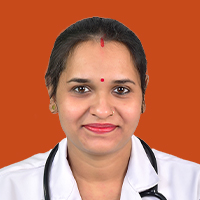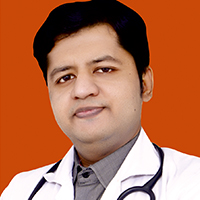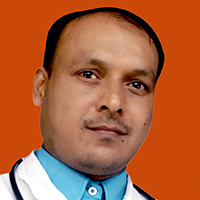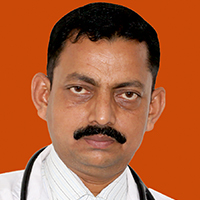

Successful Treatments
Clinics
Doctors
What is COPD?
Chronic Obstructive Pulmonary Disease (COPD) is a chronic respiratory disease of the lung that impairs breathing. The disease includes two main conditions: emphysema, which damages the air sacs or alveoli in the lungs, and chronic bronchitis, which inflames and constricts the bronchial tubes. The leading cause of COPD is the long-term exposure to irritants, most often cigarette smoke. Other causes are air pollution, occupational dust, and fumes.
In Ayurveda, COPD is related to a breathing disorder called ‘Tamaka Shwasa’. According to Ayurveda, your body has three doshas - Vata, Pitta, and Kapha. COPD is characterised by Vata (air and movement) and Kapha (mucus and fluid), and only sometimes, Pitta (heat and inflammation) imbalance.
When Kapha blocks the small airways in your lungs, Vata (air) also gets blocked. This trapped air pushes against and damages your lungs. Pitta may also cause heat and inflammation. This is why you feel chest tightness, breathlessness, coughing with phlegm, or even wheezing.
Ayurvedic treatment for COPD aims at clearing your blocked airways, balancing doshas, and strengthening your lungs. Cure for COPD in Ayurveda includes:
- Herbal medicines.
- Detox therapies like Panchakarma.
- Breathing exercises (Pranayama).
- Changing the diet.
- Lifestyle advice to avoid smoking and other triggers.
With this all-natural and holistic approach, Ayurveda aims to improve not only your COPD symptoms but also your complete lung health and energy levels.
What are the Stages of COPD?
COPD does not appear suddenly. Rather, it develops slowly and becomes increasingly severe with time. Doctors perform a breathing test called FEV1 (Forced Expiratory Volume in 1 second) to see how your lungs are working. Based on this, COPD is categorised into four stages:
Stage 1 - Mild COPD
At this stage, you might not even realise something is wrong. You may feel short of breath when you go up stairs or walk fast. Here, the lung damage is minor and your FEV1 score is still 80% or more of normal.
Stage 2 - Moderate COPD
Now, when you progress to this stage, the symptoms are harder to ignore. You may cough more often, feel your chest tightening, or have to stop and catch your breath even when walking on normal ground. Here, FEV1 ranges between 50% and 80% of normal.
Stage 3 - Severe COPD
In this stage, breathing becomes even harder. You may feel breathless even while dressing or bathing. You might also get tired easily or feel weak. FEV1 reaches 30% -50% at this stage.
Stage 4 - Very Severe COPD (End Stage)
This is the most serious stage. You might have trouble breathing even at rest, and your oxygen levels might be really low. In this stage, the risk of heart or lung failure is also higher. Here, FEV1 is less than 30%.
Common Causes of COPD
As we have discussed, COPD develops slowly over time and generally begins with damage to your lungs that you do not even realise. The main causes of COPD are:
- Smoking: If you smoke cigarettes, bidis, or pipes, you have the greatest risk of COPD. Actually, more or less 20-30% of long-term smokers develop COPD. Even if you have stopped smoking, the damage might have started earlier. Even if you passively smoke, i.e., breathe in smoke from others, this can also harm your lungs over time.
- Exposure to Fumes and Pollution: Breathing in toxic fumes like those from wood, coal, or kerosene used for cooking or heating can also cause COPD. In most rural and semi-urban homes of India, this is a common cause. If you work somewhere where dust, smoke, or chemicals are found every day, you are at a higher risk.
- Chronic Bronchitis & Emphysema: COPD could begin as chronic bronchitis (chronic coughing with mucus) or emphysema (lung injury by irritated airways). These conditions can narrow your airways and trap air inside, making it hard to breathe. Chronic breathing problems or repeated chest infections may increase your risk for COPD.
- Asthma with Smoking: If you have asthma and you also smoke, you have a higher chance of COPD. The inflammation from asthma and smoke damage makes your lungs even weaker.
- Age and Genetics: COPD generally appears after the age of 40. But in rare cases, many people inherit alpha 1 antitrypsin deficiency, which weakens the lungs and leads to COPD, even if you don't smoke.
Jiva Ayunique™ Treatment Philosophy - A Holistic Approach to COPD
Jiva Ayurveda offers holistic Ayurvedic treatment of COPD using evidence-based and time-tested Ayurvedic methods. Our treatment plans are made specifically to target the root causes of COPD, and instead of just treating the symptoms, they focus on complete healing, balance and stability.
Core Principles of the Jiva Ayunique™ Treatment Philosophy
- HACCP Certified Ayurvedic Medicines: These are HACCP certified herbal mixtures prepared to restore balance and emotional calm.
- Relaxing Practices Like Yoga & Meditation: Easy daily routines which make you feel much more calm, let you handle stress better and elevate your mood.
- Healing Ayurvedic Treatments: Natural therapies like oil massages and detox methods (like Panchakarma) to cleanse your body and support your mental and emotional health.
- Easy Diet & Lifestyle Guidance: Expert tips on eating better, living healthier and developing habits that help you feel your best everyday.
Ayurvedic Medicines for COPD
Ayurveda offers a natural method to manage COPD with proven herbs that help to strengthen your lungs, reduce inflammation, and expel mucus from your airways. These herbs support easier breathing and improve your overall energy and immunity.
These are some effective Ayurvedic herbs and natural remedies commonly used as a cure for COPD in Ayurveda:
Vasaka (Adhatoda vasica)
Vasaka is one of the most important herbs for respiratory problems. It clears unwanted mucus from lungs, chest, and nose to help you breathe much better. Also, it is considered effective in lung infections and other respiratory conditions like asthma, bronchitis and sinusitis.
Pushkarmool (Inula racemosa)
Pushkarmool works best in people who have trouble breathing and feel tightness in their chest. It helps with wheezing and coughing by clearing mucus and opening up your airways. It also supports normal lung function and better oxygen flow.
Mulethi/Licorice (Glycyrrhiza glabra)
Mulethi is a sweet-tasting root that soothes your lungs and is used for dry or productive coughs. It reduces chest pain, clears phlegm and helps you breathe better. It contains compounds like glycyrrhizic acid which lower inflammation and prevent your lung tissues from further damage. It is especially useful if your mucus is yellow or green, which indicates an infection.
Tulsi/Holy Basil (Ocimum sanctum)
Tulsi is also called "Queen of Herbs." It acts as an expectorant, i.e, it breaks down and removes mucus from your lungs. Tulsi also has anti-inflammatory and antioxidant properties that protect your lungs and reduce breathing difficulty.
Ashwagandha (Withania somnifera)
Ashwagandha strengthens your body and increases your energy levels if you are struggling with COPD. It helps to reduce fatigue, improve breathing, and clear thick mucus from your lungs and nose. It also supports your immune system, which is usually weak if you have chronic lung problems.
Curcumin (from Turmeric)
Turmeric contains the active ingredient curcumin. This is basically an antioxidant that protects you from lung inflammation. It protects your lungs’ tissues from damage and helps you breathe better. Curcumin is especially effective against chronic lung inflammation.
Adraka (Ginger)
Ginger has warming and anti-inflammatory properties. It clears your blocked airways and supports lung detox. Ginger also strengthens your digestion which is important for the Ayurvedic treatment of respiratory diseases.
Ela (Cardamom)
Cardamom helps clear mucus and calm your respiratory tract. It refreshes your breath and supports better airflow through the lungs. It is generally added to herbal mixtures for its therapeutic benefits.
Trikatu
Trikatu is prepared by combining three herbs- black pepper, long pepper and ginger. It improves your digestion and metabolism and clears toxins from your lungs. It also improves the absorption of other herbs for faster recovery.
Pippali (Long Pepper)
Pippali is believed to strengthen your lungs and clear out accumulated phlegm. It also improves your breathing capacity and controls recurring lung infections.
Garlic (Allium sativum)
Garlic possesses excellent anti-inflammatory and antibacterial qualities. It helps to reduce mucus buildup, fights infection, and supports lung health. It also increases blood circulation for better oxygen delivery.
Vitamin D
It has been seen that most people with COPD have low amounts of vitamin D. This Vitamin helps keep your lungs healthy and also aids in preventing severe signs. Taking it under Ayurvedic supervision can help with your recovery.
These Ayurvedic herbs are often taken together depending on your condition and stage of COPD. Before starting any herbal treatment, it is important that you speak with a licensed Jiva Ayurvedic doctor, particularly if you're on any other medication or have any other health problem.
Ayurvedic Treatment for COPD
Ayurveda considers this disease an imbalance of both Kapha (Earth and water) and Vata doshas, involved with the respiratory system (Prana Vaha Srotas). Ayurveda treatment primarily focuses on-
- Reducing inflammation: That is the use of Anti-inflammatory herbal remedies.
- Drain mucus: Such as the use of expectant herbs, therapies.
- Strengthen lungs: By refreshing herbs, lifestyle changes.
- Digestive improvement: It is crucial for overall health and immune system. Ayurvedic Medications may include the following:
- Herbal remedies: Vasa (Adhatoda vasica), Kantakari, and Tulsi (Ocimum sanctum) are commonly used herbs for respiratory conditions. These are believed to have bronchodilator, expectorant, and anti-inflammatory properties.
- Panchakarma therapies: Therapies like Vamana (emesis) and Virechana (purgation) may be used to eliminate excess Kapha.
- Lifestyle modifications: Dietary changes, breathing exercises (Pranayama), and stress management techniques are recommended.
Diet & Exercise
Diet and exercise are important supportive measures for managing COPD.
- Diet: A light, warm, and easily digestible diet is recommended. Heavy, oily, cold, and processed foods should be avoided as they aggravate Kapha. Include warm liquids, soups, and spices like ginger, turmeric, and black pepper.
- Exercise: Regular gentle exercise, like walking, helps improve lung function and endurance. Pranayama, such as Bhastrika and Anuloma Viloma, can strengthen the respiratory system.
FAQs
- Is COPD curable?
COPD is a progressive disease with no cure, but its progression can be slowed, and symptoms can be managed.
- Is smoking the only cause of COPD?
While smoking is the leading cause, exposure to air pollution, occupational dusts and fumes, and genetic factors can also contribute.
- Can COPD be reversed?
The lung damage caused by COPD is generally irreversible, but treatment can help improve lung function and quality of life.
- Are there any specific breathing exercises for COPD?
Pursed-lip breathing and diaphragmatic breathing can be helpful for managing shortness of breath. Pranayama techniques from yoga are also beneficial.
- Can Ayurveda replace the conventional treatment of COPD?
Ayurveda can be an excellent adjunct therapy, but it is always recommended to consult with a medical doctor and an Ayurvedic practitioner.
- What are some good dietary tips for COPD?
Avoid mucus-forming foods like dairy products, processed foods, and sugary drinks. Focus on warm, cooked foods and plenty of fluids.
- How can I avoid exacerbations of COPD?
Avoid exposure to irritants such as smoke and air pollution, keep vaccinated against flu and pneumonia, and follow your treatment plan.
- Does stress trigger the worsening of COPD symptoms?
Yes, but it worsens breathing. Techniques to manage stress are helpful.
- What are the stages of COPD?
COPD is staged with respect to lung function tests (FEV1).
- Can herbal remedies interact with other medications?
Yes, they can. Some herbs do interact with medications. Make sure to let your doctor know if you are on any herbal supplements.
Top Ayurveda Doctors
Our Happy Patients
Social Timeline
Blogs
Home Remedies
Related Disease
- Ayurvedic Treatment of Childhood Asthma
- Ayurvedic Treatment for bronchitis
- Ayurvedic Treatment for Sinusitis
- Ayurvedic Treatment for Rhinitis
- Ayurvedic Treatment for Skin allergy
- Ayurvedic Treatment for laryngitis
- Ayurvedic Treatment for COPD
- Ayurvedic Treatment for Influenza
- Ayurvedic Treatment for Pleurisy
- Ayurvedic Treatment for Tuberculosis (TB)
- Ayurvedic Treatment for Pneumonia
- Ayurvedic Treatment for Pulmonary Edema
- Ayurvedic Treatment for Tuberculosis
- Get Ayurvedic Treatment For Pneumothorax
- Asthma Treatment in Ayurveda
Latest Blogs
- क्या अचानक बढ़ता दर्द और जोड़ों की लालिमा गाउट की निशानी है? शरीर में जमा अम्ल की भूमिका समझिए
- Migraine और भोजन का समय: देर से खाना सिरदर्द को क्यों बढ़ा देता है?
- क्या एंटीबायोटिक लेने के बाद पाचन पूरी तरह बिगड़ गया? आयुर्वेद के अनुसार Colitis के उपचार जानें
- अगर मामूली आहार भी पाचन तंत्र सहन न कर पाए तो Colitis को हल्का क्यों नहीं मानना चाहिए? आयुर्वेदिक दृष्टि से जानें
- लंबे समय से सक्रिय Colitis क्यों शरीर की रिकवरी क्षमता को कमज़ोर कर देती है? आयुर्वेदिक नज़र से जानें
- नॉर्मल एंडोस्कोपी, नॉर्मल रिपोर्ट्स… फिर भी रोज़ दर्द—IBS में गलत इलाज कैसे बीमारी को Chronic बना देता है! आयुर्वेदिक उपचार समझें
- क्या बाहर का खाना या मसालेदार भोजन आपके IBS को तुरंत ट्रिगर कर देता है? आयुर्वेदिक दृष्टि से समझें और कब Ayurvedic doctor से मिलना चाहिए जानें
- IBS में दवाइयाँ काम क्यों नहीं करतीं? आयुर्वेदिक कारण और उपचार समझें
- कभी कब्ज़, कभी दस्त: यह सिर्फ पाचन नहीं, पूरे सिस्टम का असंतुलन हो सकता है! जानें कब Ayurvedic doctor से मिलना ज़रूरी हो जाता है
- क्या सर्दियों में दवाइयों के बावजूद साँस पूरी नहीं खुलती? अस्थमा की जड़ आयुर्वेद से समझें
- क्या धूल, धुआँ या परफ्यूम से तुरंत साँस लेने में तकलीफ़ होती है? Asthma के ट्रिगर आयुर्वेद की नज़र से समझें
- सर्दियों में अस्थमा क्यों ज़्यादा बिगड़ जाता है? ठंडी हवा और कफ-वृद्धि का आयुर्वेदिक कारण जानें
- क्या ठंडी हवा लगते ही सीने में जकड़न और साँस लेने में परेशानी होती है? अस्थमा को आयुर्वेद की नज़र से जानें
- क्या सुबह उठते ही बलगम के साथ खाँसी आना अस्थमा का संकेत है? आयुर्वेद से समझें
- क्या लंबे समय तक लैक्सेटिव का उपयोग आपकी कब्ज़ को और जटिल बना रहा है? आयुर्वेदिक समाधान जानें
- क्या गैस, पेट फूलना और सिरदर्द का साथ में होना Chronic Constipation का क्लासिक पैटर्न है? आयुर्वेदिक व्याख्या समझें
- क्या सुबह नींद खुलते ही पेट साफ न होना ‘धीमी अग्नि’ का संकेत है? दीर्घकालिक कब्ज़ में आयुर्वेदिक कारण जानें
- क्या लंबे समय तक बैठकर काम करने से आपकी कब्ज़ लगातार बढ़ रही है? आयुर्वेदिक दृष्टिकोण देखें
- क्या कब्ज़ के चलते आपकी नींद, ऊर्जा और पाचन सब प्रभावित हो रहे हैं? आयुर्वेद में इसके मूल कारण और ज़रूरी उपाय जानें
- क्या तनाव और चिंता भी Chronic Constipation का छुपा हुआ कारण बन सकते हैं? आयुर्वेदिक दृष्टि देखें
Ayurvedic Doctor In Top Cities
- Ayurvedic Doctors in Bangalore
- Ayurvedic Doctors in Pune
- Ayurvedic Doctors in Delhi
- Ayurvedic Doctors in Hyderabad
- Ayurvedic Doctors in Indore
- Ayurvedic Doctors in Mumbai
- Ayurvedic Doctors in Lucknow
- Ayurvedic Doctors in Kolkata
- Ayurvedic Doctors in Patna
- Ayurvedic Doctors in Vadodara
- Ayurvedic Doctors in Ahmedabad
- Ayurvedic Doctors in Chandigarh
- Ayurvedic Doctors in Gurugaon
- Ayurvedic Doctors in Jaipur
- Ayurvedic Doctors in Kanpur
- Ayurvedic Doctors in Noida
- Ayurvedic Doctors in Ranchi
- Ayurvedic Doctors in Bhopal
- Ayurvedic Doctors in Ludhiana
- Ayurvedic Doctors in Dehradun









































